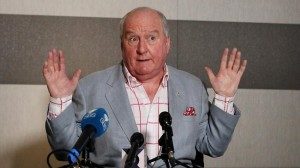
Editor’s Note: I am pleased to be providing you with a guest post by the very talented, Dr. Tony Jaques.
When a social media campaign forced advertisers to abandon a high profile Australia talkback radio show, some people cried “censorship” and “cyber-bullying” while others said it was just online democracy at play.
The controversy began when right-wing Sydney radio host, Alan Jones, made some highly offensive remarks about Prime Minister Julia Gillard at a political dinner. Unfortunately a journalist at the dinner recorded the whole event and when the story broke Jones found himself the subject of almost universal condemnation.
After a rambling “non-apology” – which Jones used mainly to defend himself and blame others – high profile advertisers and sponsors began withdrawing their support for his program.
But the story took an entirely different turn when a social media campaign was launched to publicly shame other advertisers to withdraw.
On air, Jones complained that he was being unfairly targeted and tried to portray himself as a victim of cyber-bullying, mainly by people who didn’t listen to his program anyway. But he got very little sympathy and, prominent politician Malcolm Turnbull spoke for many people when he said the aggressive “shock jock” was simply getting a bit of what he usually dishes out to others.
Within days, 70 advertisers had withdrawn and the radio station made the extraordinary announcement that they would suspend advertising altogether during Jones’ daily broadcast.
That’s when the questions began to be asked: The Editor of online marketing newsletter Mumbrella, Tim Burrowes, asked what happens when you deny a living to anybody who expresses opinions we disagree with?
“You’re perfectly entitled to tell brands what you think of their support of a particular show is. That’s your right. When you get organised to do so, you are exerting economic pressure to get him taken off the air. That’s also your right. But let’s be clear: You are trying to force somebody off the air because you don’t like what he has to say. Be sure to admit to yourself that you are acting in favour of censorship.”
By contrast consumer activist Matt Jones sees this as little different from consumers expressing their social preferences through consumption – as many Americans did during the recent Chick-fil-A controversy.
“When people use social media to amplify their voices, accelerating and multiplying the impact of their purchase intentions, is that cyber bullying? Or just consumers seeking to shape the world they live in, not just shop it? I’ve found the online response to Alan Jones’ comments genuinely uplifting. It’s consumers voting (vocally) with their wallets.”
So those are their opinions, now I’d like to hear yours.
Censorship? Cyber bullying? Or free speech? What do you think? Let me know in the comments section below!
Tony Jaques is an Australian-based consultant working in the areas of issues, crises and risk communication. He writes the regular e-newsletter Managing Outcomes and is author of the new book Issue and Crisis Management: Exploring issues, crises, risk and reputation (Oxford University Press, 2014)

Just ask Howard Stern and others. Jones will recover, but he has to change venues. As my grandma used to say, "live by the sword, die by the sword." I do believe very strongly in the cyber bullying of brands, but not sure this fits the bill.
I'd have to agree with you, Chris. It's a great example and a topic of discussion that gets people thinking, but cyberbullying… not quite sure that this one "fits the bill" either. We've seen these types of remarks and public figures/characters for as long as I can remember and they aren't going anywhere. Though it's fun to see the new combination of their words meeting the public's voice through social media! 😉
Hi Chris. Alan Jones certainly "lives by the sword". His talkback program is notorious for verbal attacks on anyone who disagrees with him. Interestingly it was Jones himself who used the term cyberbullying to characterise the activists who mobilised the campaign to shame his advertisers and sponsors. I agree it was a misuse of the term, Moving to a new station is not likely as Jones is a substantial shareholder in his current radio station. It will eventually blow over, although since I wrote this post some advertisers have returned and some have already withdrawn again after continued activists pressure. Jones has a large audience but I think an important lesson from this case is that even such a major advertising market is no longer a guarantee of immunity.
The public seem to be very forgiving and not too worried by the views of the "cyber-elite". The latest audience survey out today shows that the radio shock jock at the centre of this issue not only maintained his audience at the top of the rankings, but actually saw a small increase. What does that tell us? http://www.theage.com.au/entertainment/tv-and-rad…
People like drama 😉
Agree w/Melissa. His audience probably loves him and is very loyal. Evidently, his sponsors don't.
Tony – from my perspective, it tells us that human nature has not changed. Where we may have expressed "outrage" at this individual in our living room or at the dinner table, we now take to the Internet (sometimes with unwanted consequences to ourselves); and then, unless passionate about the subject to the extent of really wanting to get someone like this off the air, move on without a glance backwards.
Hi Judith. you are right that most of us mutter and mumble and then move on. But in this case his behaviour was so egregious, and repeated, that an online group have sent themselves up specifically to dog his every move and keep pressure on his advertisers. There is a line between complaining and camaigning, and even though that line is hard to judge, I think that one lesson from this case is that some people cross that line and can no longer just say "I will ingore it and it will go away"